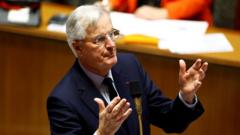France is currently grappling with significant political upheaval following a no-confidence vote that has toppled Prime Minister Michel Barnier's government. This crisis is not just a localized issue; it deeply concerns Europe as a whole, as France and Germany have historically been seen as the driving force behind the European Union (EU).
Barnier's attempt to implement a social security budget using special powers has ignited opposition among various political factions in Parliament, highlighting the fractious landscape of French democracy. This disarray is part of a broader trend across Europe, with Germany also facing its own political crisis after its coalition government recently collapsed, prompting a snap general election.
The instability in France raises pressing questions about the EU's ability to present a united front against external threats, particularly from an aggressive Russia and concerns over support for Ukraine amidst a potential shift in U.S. foreign policy under Donald Trump. Trump's anticipated return to power raises anxiety among European leaders regarding the potential reduction of U.S. military aid to Ukraine and the implications of his attitudes toward European trade and defense spending.
Amidst this turmoil, France is in a precarious position, with a ballooning budget deficit and escalating government debt sparking fears among both French citizens and their European neighbors. The challenges are compounded by a divided French parliament, which has made it difficult for President Emmanuel Macron to push through necessary reforms and fiscal measures. Macron, who presents himself as a stabilizing force, faces increasing pressure from various political factions that are utilizing the situation to question his leadership.
Notably, the rising influence of Marine Le Pen, leader of the National Rally Party, poses a distinct threat to the political landscape. With her own legal troubles looming, Le Pen has every reason to advocate for Macron's resignation, which could pave the way for her to run for the presidency in the next election cycle.
As the political climate grows increasingly tense, the implications of France's crisis are felt well beyond its borders. With both France and Germany facing their own respective challenges, the EU is at a crucial juncture that may define its future direction. The interconnected nature of political, social, and economic issues across member states means that what unfolds in France will have significant repercussions across the continent.


















